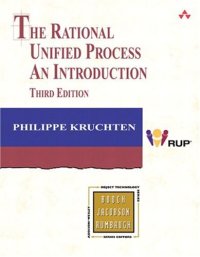
Ebook: The Rational Unified Process: An Introduction
Author: Philippe Kruchten
- Year: 2003
- Publisher: Addison-Wesley Professional
- Edition: 3
- Language: English
- chm
The Rational Unified Process is a software engineering process developed and marketed by Rational Software. It is a disciplined approach to assigning and managing tasks and responsibilities in a development organization. The goal of this process is to produce, within a predictable schedule and budget, high-quality software that meets the needs of its end users. The Rational Unified Process captures many of the best practices in modern software development and presents them in a tailorable form that is suitable for a wide range of projects and organizations. The Rational Unified Process delivers these best practices to the project team online in a detailed, practical form. This book provides an introduction to the concepts, structure, contents, and motivation of the Rational Unified Process. Goals of This Book In this book, you will learn what the Rational Unified Process is and what it is not; master the vocabulary of the Rational Unified Process and understand its structure; develop an appreciation for the best practices that we have synthesized in this process; and understand how the Rational Unified Process can give you the guidance you need for your specific responsibility in a project. This book is an integral part of the Rational Unified Process, but it is not the complete Rational Unified Process. Rather, it is a small subset. In the full Rational Unified Process you will find the detailed guidance needed to carry out your work. The full Rational Unified Process product - the online knowledge base - can be obtained from Rational Software. This book makes numerous references to the Unified Modeling Language (UML), but it is not an introduction to the UML.That is the focus of two other books: The Unified Modeling Language User Guide and The Unified Modeling Language Reference Manual. This introductory book speaks about modeling and object-oriented techniques, but it is not a design method, and it does not teach you how to model. Detailed steps and guidance on the various techniques that are embedded in the Rational Unified Process can be found only in the process product. Several chapters of this book discuss project management issues. They describe aspects of planning an iterative development, managing risks, and so on. This book, however, is by no means a complete manual on project management and software economics. For more information, we refer you to the book Software Project Management: A Unified Framework. The Rational Unified Process is a specific and detailed instance of a more generic process described in the textbook The Unified Software Development Process. Who Should Read This Book? The Rational Unified Process, An Introduction, Second Edition is written for a wide range of people involved in software development: project managers, developers, quality engineers, process engineers, method specialists, system engineers, and analysts. This book is relevant especially to members of an organization that has adopted the Rational Unified Process or is about to adopt it. It is likely that an organization will tailor the Rational Unified Process to suit its needs, but the core process described in this book should remain the common denominator across all instances of the Rational Unified Process. This book will be a useful companion to students taking one of the many professional education courses delivered by Rational Software and its partners in industry and academia. It provides a general context for the specific topics covered by the course. This book assumes that you have a basic understanding of software development. It does not require specific knowledge of a programming language, of an object-oriented method, or of the Unified Modeling Language.
Download the book The Rational Unified Process: An Introduction for free or read online
Continue reading on any device:

Last viewed books
Related books
{related-news}
Comments (0)